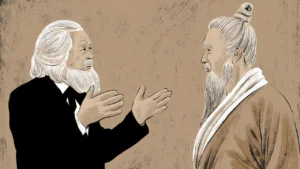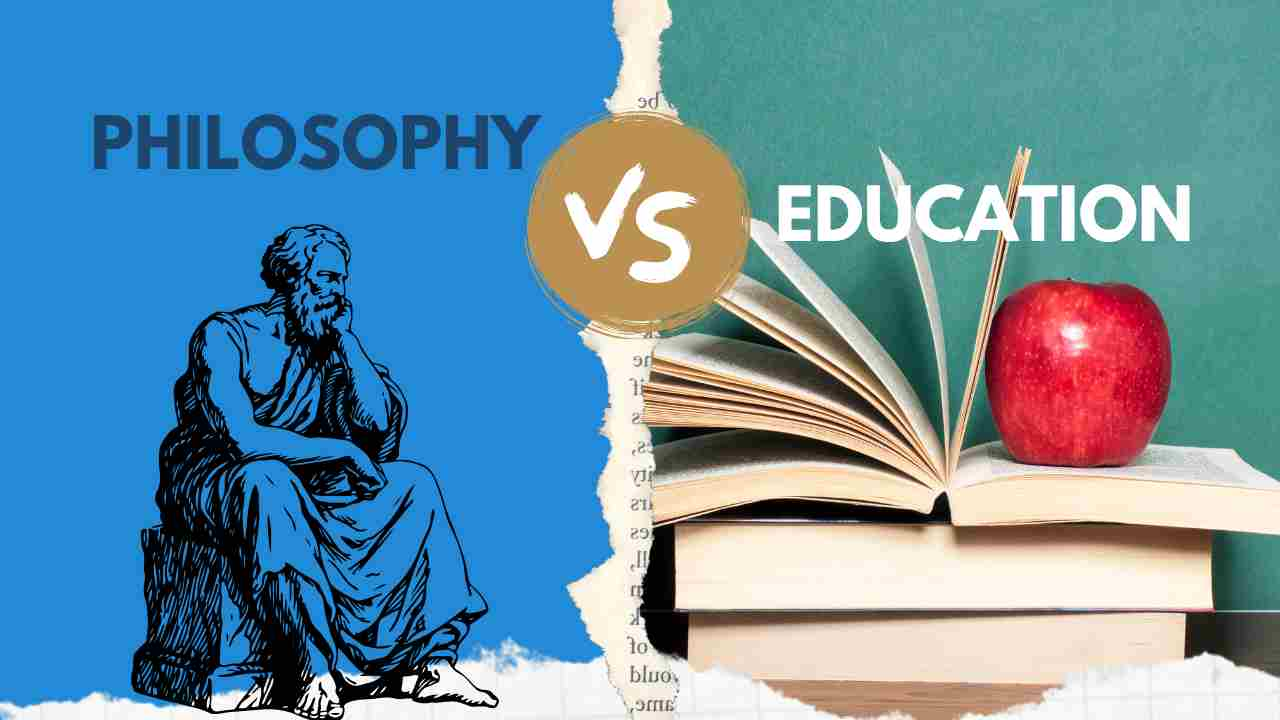Confucius, the ancient Chinese philosopher whose ideas have shaped East Asian thought for centuries, continues to exert influence in the modern world. While his teachings were formulated in a vastly different era, their relevance persists, prompting scholars and thinkers to reexamine and reinterpret his wisdom to address the challenges of today’s society. In this article, we explore the enduring relevance of Confucius and how his principles can be applied to navigate the complexities of the contemporary world.
The Foundation of Confucian Thought

At the heart of Confucian philosophy lies the concept of moral cultivation and social harmony. Confucius emphasized the importance of cultivating virtue in individuals to create a harmonious society. Central to his teachings are the principles of ren (benevolence), yi (righteousness), li (propriety), zhi (wisdom), and xin (sincerity). These virtues serve as the foundation for personal conduct and ethical governance, promoting the well-being of both individuals and communities.
Confucius believed that the key to achieving social order and harmony was through the cultivation of moral character. He emphasized the importance of self-reflection and continuous self-improvement, advocating for individuals to strive for moral excellence in their daily lives. By embodying virtues such as benevolence, righteousness, and sincerity, individuals could contribute to the betterment of society as a whole.
Confucianism also emphasizes the importance of interpersonal relationships and social harmony. Confucius taught that individuals should fulfill their roles and responsibilities within the family, community, and society at large. This emphasis on social harmony underscores the interconnectedness of individuals and the importance of mutual respect and cooperation in fostering a harmonious society.
Reinterpreting Confucian Values in the Modern Context
In the rapidly changing landscape of the modern world, the principles espoused by Confucius offer valuable insights into addressing contemporary challenges. While the context may have evolved, the fundamental values of Confucianism remain relevant in fostering social cohesion and ethical leadership.
One of the key tenets of Confucianism is the importance of filial piety and respect for authority. In today’s multicultural and diverse societies, this principle can be reinterpreted to emphasize the value of respect for all individuals, regardless of their background or social status. By promoting mutual respect and understanding, societies can cultivate inclusivity and foster a sense of belonging among diverse communities.
Moreover, Confucianism promotes the idea of social harmony through the cultivation of moral virtues such as compassion, empathy, and humility. These virtues are essential for building trust and fostering cooperation among individuals from different cultural, religious, and socioeconomic backgrounds. By embracing the principles of Confucian ethics, societies can overcome divisions and work towards a more unified and harmonious future.
Applying Confucian Ethics in Governance and Leadership
Confucian ethics also provide a framework for ethical governance and leadership in the modern world. Central to Confucian political thought is the concept of benevolent governance, wherein rulers are expected to prioritize the well-being of their subjects and govern with compassion and integrity.
In contemporary politics, the principles of benevolent governance can be applied to promote social justice, equity, and the common good. Leaders who embody Confucian virtues such as integrity, empathy, and humility are better equipped to address the complex challenges facing society, fostering trust and cooperation among citizens.
Furthermore, Confucianism emphasizes the importance of moral education and the cultivation of virtuous leaders. By promoting ethical leadership grounded in Confucian values, societies can create a more just and equitable political system that serves the needs of all citizens. Through ethical governance and leadership, societies can strive towards a more harmonious and prosperous future for all.
Exploring Confucian Influence in Education

Confucianism’s influence on education extends beyond East Asia, impacting educational practices and values worldwide. In the Confucian tradition, education is not merely about acquiring knowledge but also about cultivating moral character and social responsibility. Confucius believed that education should instill virtues such as benevolence, righteousness, and propriety in students, preparing them to contribute positively to society.
In modern educational settings, the principles of Confucianism continue to shape pedagogy and curriculum development. Educators incorporate Confucian values into teaching methodologies, emphasizing the importance of ethical conduct, critical thinking, and civic engagement. By integrating Confucian ethics into education, schools can foster a culture of respect, empathy, and social responsibility among students, preparing them to be ethical leaders and active citizens in a globalized world.
Furthermore, Confucianism emphasizes the role of the teacher as a moral exemplar and guide for students. Educators strive to embody Confucian virtues in their interactions with students, serving as role models for ethical behavior and moral development. Through mentorship and guidance, teachers help students cultivate virtues such as integrity, compassion, and humility, nurturing their holistic development as individuals and contributing to the flourishing of society as a whole. With the help of such principles, science tutors in Boulder manage to teach their students the necessary knowledge and help them achieve excellent results.
Ethical Business Practices in the Confucian Tradition
In the realm of business, Confucian ethics provide a framework for promoting integrity, trustworthiness, and ethical conduct. Confucius emphasized the importance of sincerity and honesty in all human relationships, including those within the business sphere. By adhering to principles of integrity, fairness, and loyalty, businesses can build trust with customers, employees, and stakeholders, fostering long-term relationships and sustainable growth.
Confucianism also emphasizes the value of social responsibility and the common good in business practices. Business leaders are encouraged to consider the broader impact of their decisions on society and the environment, striving to balance economic goals with ethical considerations. By integrating Confucian values into corporate culture and decision-making processes, businesses can contribute to the well-being of society while achieving financial success. At various European seminars that you can visit by renting a car in Beograd, the idea of business principles is promoted that can help you achieve your success faster and easier by ruling these values.
Moreover, Confucianism emphasizes the importance of ethical leadership in business. Leaders are expected to lead by example, embodying Confucian virtues such as benevolence, righteousness, and humility in their actions and decisions. By fostering a culture of ethical leadership and accountability, businesses can cultivate a positive organizational climate that promotes employee morale, engagement, and innovation, ultimately driving sustainable business success. Social gatherings accompanied by excellent sumptuous cheese boards between colleagues and the manager can contribute to closeness and better commitment of everyone in the team.
Confucian Perspectives on Family and Community
Confucianism places a strong emphasis on the family as the cornerstone of social order and harmony. Confucius believed that a well-functioning society begins with strong familial relationships characterized by filial piety, respect for elders, and mutual support. In Confucian thought, the family serves as a microcosm of society, with each member playing a unique role in maintaining harmony and balance. The health clinic in Marietta GA also advocates such relationships because it helps our personal health and achievement, but if we have any problems or someone from our family has them, we can turn to one of their excellent doctors who will make sure that the problem is solved.
In contemporary society, Confucian values continue to shape familial dynamics and social interactions. While traditional gender roles may have evolved, the importance of family cohesion and mutual support remains central to Confucian ethics. Families strive to cultivate virtues such as compassion, empathy, and filial piety in their interactions, fostering a sense of belonging and unity among members. What is needed from time to time is a vacation where all family members will get closer and understand each other, and the best for that is the sea and the beach where you can enjoy your favorite swimsuit while sunbathing or swimming in the sea.
Furthermore, Confucianism emphasizes the interconnectedness of individuals within communities. Community members are encouraged to support one another, collaborate on shared goals, and contribute to the well-being of society as a whole. By promoting cooperation, reciprocity, and social responsibility, Confucian values help strengthen social bonds and foster a sense of solidarity among diverse communities. Something like this will certainly be contributed by excellent online courses that will not only help you improve your skills and hobbies but will also improve your relationship with society and the environment.
Confucian Influence on Gender Roles and Relationships
Confucianism has historically been criticized for reinforcing patriarchal norms and hierarchical gender roles. However, contemporary interpretations offer insights into redefining gender relationships based on principles of mutual respect, equality, and cooperation. While Confucius emphasized the importance of filial piety and obedience to authority, modern scholars argue for a more inclusive and egalitarian understanding of Confucian ethics. At that time in history, when brave warriors on their horses with traditional saddle blankets defended the people, this order was clear and maintained, however, today necessary changes are appearing that also affect the world order.
In modern society, Confucian values can inform efforts to promote gender equality and empower women in various spheres of life. By emphasizing the importance of mutual respect, understanding, and collaboration, Confucianism challenges traditional gender stereotypes and encourages individuals to strive for harmonious and egalitarian relationships. Moreover, Confucianism underscores the value of balance and harmony in all aspects of life, including gender dynamics, promoting a more inclusive and equitable society for all. Thus, companies in their offices protected under an excellent access control system from Philadelphia must have a team that is gender equal and values commitment and effort above all other characteristics.
Furthermore, Confucianism highlights the importance of moral character and ethical conduct in interpersonal relationships. Regardless of gender, individuals are encouraged to cultivate virtues such as benevolence, righteousness, and sincerity in their interactions with others, fostering mutual respect and trust. By embodying Confucian values in their relationships, individuals can contribute to the creation of a more harmonious and compassionate society, where all members are valued and respected for their unique contributions. If you are committed to progress and learning, you can achieve a lot regardless of gender, and if you want to really progress with your company and get in touch with other companies that can help you achieve your goal, you will need an excellent M&A business advisor.
Confucianism and Environmental Stewardship
While Confucius did not explicitly address environmental issues, his emphasis on harmony with nature and the interconnectedness of all living beings offers insights into promoting environmental stewardship and sustainability. In Confucian thought, humans are seen as part of the natural world, with a responsibility to act as stewards of the environment and preserve its balance and beauty for future generations. New smoking accessories that leave a better impression on the health of the individual as well as on the environment can serve these purposes very well.
In modern times, Confucian values can inform efforts to address pressing environmental challenges such as climate change, pollution, and resource depletion. By integrating Confucian ethics into environmental policies and practices, societies can strive towards a more harmonious relationship with the natural world, guided by principles of reverence, balance, and respect for all living beings. This can be achieved, of course, only in settlements that think the same and contribute to the preservation of the environment, and you can consider houses in Boca Falls for living because they have an excellent ecological footprint on their surroundings and are also spacious and very luxurious.
Moreover, Confucianism emphasizes the importance of moral character and ethical conduct in environmental stewardship. Individuals are encouraged to cultivate virtues such as frugality, humility, and mindfulness in their interactions with the natural world, promoting sustainable living practices and responsible consumption habits. By embodying Confucian values in their daily lives, individuals can contribute to the preservation of the environment and the well-being of future generations, ensuring a more sustainable and prosperous future for all. What can also help you environmentally and economically is a great roadside assistance app that you may find useful in the event of an accident or breakdown so that you can worry less about your journey.
Confucian Influence on Legal Systems and Justice
Confucianism has left a lasting impact on legal systems and notions of justice in East Asian societies. While modern legal frameworks may differ from traditional Confucian principles, there are areas of convergence, particularly in the emphasis on fairness, impartiality, and the rule of law. Confucianism underscores the importance of ethical conduct and moral character in legal practice, guiding judges, lawyers, and lawmakers in their pursuit of justice. Young people must get involved in the debate about this topic by learning more about it and seeing its importance so that they can get involved in organizations like the Readathon school fundraiser with which they will be able to acquire excellent reading habits necessary for the future.
In modern legal systems, Confucian values can inform efforts to promote fairness, equality, and the protection of human rights. By integrating Confucian ethics into legal education and professional training, legal professionals can cultivate a sense of ethical responsibility and social justice in their work. Furthermore, Confucianism emphasizes the importance of empathy and compassion in the administration of justice, encouraging judges and lawmakers to consider the broader impact of their decisions on individuals and communities. This can sometimes be difficult, especially when looking for the culprit in a case like a traffic accident, but at least when it comes to your car, you can easily solve any problem at a transmission service in Buffalo.
Moreover, Confucianism highlights the role of the government in promoting social harmony and the common good. Rulers are expected to govern with benevolence and integrity, prioritizing the well-being of their subjects over personal gain or self-interest. By embodying Confucian virtues such as righteousness, sincerity, and humility, leaders can foster trust and cooperation among citizens, ultimately contributing to a more just and harmonious society. With an internet provider that manages IT services in San Antonio, users are provided with excellent internet so that they can stay up to date with the happenings on the political scene as well as influence new changes.
Confucian Perspectives on Global Citizenship

In an increasingly interconnected world, Confucianism offers insights into fostering a sense of global citizenship rooted in empathy, compassion, and mutual respect. Confucian values emphasize the importance of cultivating virtues such as benevolence, righteousness, and sincerity in all human relationships, transcending cultural boundaries, and promoting universal principles of ethical conduct and social responsibility. If you want to get more involved in these changes and find out important facts about this, you can rent a car in Beograd and visit some of the European events with motivational speakers who explain this topic and its importance for the world today.
In contemporary society, Confucianism can inform efforts to address global challenges such as poverty, inequality, and environmental degradation. By promoting cross-cultural understanding and cooperation, individuals can work together to build a more inclusive and harmonious global community. Confucian principles of mutual respect, reciprocity, and social responsibility serve as guiding principles for promoting dialogue, collaboration, and peace among nations. Homeschooling tutors in Bettendorf encourage their students to study and get excellent results in their tests which will help them to succeed later and make a strong impact on the change in the social system.
Moreover, Confucianism emphasizes the importance of moral character and ethical conduct in global citizenship. Individuals are encouraged to cultivate virtues such as compassion, empathy, and humility in their interactions with others, fostering mutual respect and understanding across diverse cultures and backgrounds. By embodying Confucian values in their daily lives, individuals can contribute to the creation of a more just, compassionate, and harmonious world for all. These are some of the value systems that can be applied in your business and company, and in order to convey this to others and boost the popularity of your brand, you will need an excellent promotion plan that can be provided by a Colorado Springs SEO company.
Conclusion
In conclusion, the enduring relevance of Confucianism in the modern world underscores its adaptability and universality as a philosophy of ethical living and governance. By reinterpreting Confucian principles in diverse contexts, we can harness the wisdom of the past to address the challenges of the present and shape a more just, compassionate, and harmonious future for all. Through ongoing dialogue and engagement with Confucian thought, we can continue to draw inspiration from its timeless teachings to navigate the complexities of the contemporary world with wisdom and integrity. This encourages us to think deeper by learning from our past mistakes, in this way we will prepare to be ready for anything, so, for example, we can take care of the scale in our pipes that can build up and lead to bursting in which case we can call emergency restoration service in Charlotte that will repair the damage.






